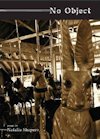|
KYSO Flash ™
Knock-Your-Socks-Off Art and Literature
|
|
|||
Just Say NoNo Object [Poems by Natalie Shapero]Reviewed by George Held
In this shrewd debut collection, “a body is no object,” a former boyfriend advises Natalie Shapero. But for the poet, the body is an object that receives considerable attention, especially with regard to sex. So perhaps the title is offered derisively, derision being a tone congenial to Shapero. In the book’s first poem, she speaks derisively of her own body, saying, “I have my ugly mouth,” on the way to writing, in the words of the assassin John Hinckley: “DON’T YOU / LIKE ME A LITTLE BIT? YOU MUST / ADMIT I AM DIFFERENT.” To Shapero, having enjoyed her book several times, I’d say, “I like you, because you are different.” Her blurb writers perceive her difference differently: one calls her book “delightful and glistening”; the other says she feels “hurt by it.” Both are partly right. No Object will seem as delightful and glistening as arousal to some readers, especially if they themselves are “different,” but will hurt those who are empathic enough to feel Shapero’s own hurt, which seems either text or subtext of many of her poems. Balancing delight and hurt is a specialty of Frederick Seidel, of whom Shapero suggests a younger, female version, though Seidel is more self-assured and more attracted to traditional form, like Dorothy Parker, another formalist to whom Shapero might be compared. But besides the approximate sonnet “You’re Allowed” and the end-rhymes “DON’T TOUCH,” “so much,” “enough,” and “so much” in “Little Winter,” Shapero generally eschews traditional prosody, though she is attentive to craft and can turn out wittily rhymed poems like “News to Me” and “Lean Time.” In the latter are found some of her persistent themes, such as being outcast, hurt, and unhappy in love: Outcasts only care what outcasts think. This hardly sounds like the voice of a passive person, but Shapero asserts in an interview that “passivity is a huge theme for me.” In another interview, she offers that “I’m kind of shy and awkward and really dependent on books for material.” Is No Object, then, the revenge of the shy and awkward part of this thirty-two year-old lawyer? Shapero’s ambiguous relationship with her themes, like passivity, shows up in some of her titles: “Sometimes Hostile Never Helpful,” “Hostile Platitudes,” and “No Please After You.” These last two poems begin approximately the last quarter of the 34 poems in the book. Whereas most debut poetry collections are front-end loaded, Shapero places many of her stronger poems toward the end, a strategy that heightens the reader’s interest where it might begin to flag. This portion contains the longest poem in the book, “HOT (NORMAL),” a 15-page catalog of Shapero’s passive-aggressive, derisory take on her life, like the rug burns she suffered when an ex-lover dragged her “in nothing / but an overlarge shirt across the carpet floor,” the cynical idea that “for every pretty girl, / there’s a man who’s sick of screwing her,” the confession “I’m destroying my body”—that “no object”; denying her religion, an important subject of earlier poems, after a college instructor “taught me how to say I AM NOT / JEWISH. It hasn’t proven useful.” The notion of utility as the measure of one’s religion illustrates Shapero’s frequent use of irony as a shield against a hurtful world. In the poem “Flags and Axes,” Shapero admits to a “ruthlessness with which I stay / upright,” to “have killed to live and live / like this, unwell, unwelcome and unmoored. . . ,” three other negative conditions. But in these later poems Shapero wears her resentful, vengeful persona unmediated by any guise of hurt innocence or justification for her hatreds. This bracing point of view underscores her difference and makes her poetry riskier and more alluring than the common fare of first-person poetry now being published. About the stress and revulsion she visits in “Flags and Axes” Shapero concludes, “I wanted none of it, and nothing else.” The last phrase employs a rhetorical twist that she has mastered, the ambiguous incomplete thought, where in this case “and nothing else” can be either finite (“but none of it”) or suggestive (“and nothing else but it”). The two negatives (“none” and “nothing”) here at the end reinforce the frequency with which this poet uses the negative, for about half the poems in this book contain a negative in their last sentence or line. And the final poem contains the series “never,” “not,” “never,” “not,” and the contraction “n’t.” It’s not for nothing, then, that Shapero calls her book No Object. Overall, however, this first book is an affirmation of the poet’s talent and guts. —Previously published in a Long Island journal entitled Book/Mark (Winter 2015); republished here by author’s permission George HeldIssue 3, Spring 2015
regularly publishes poetry, fiction, and book reviews, both online and in print. He has received eight Pushcart Prize nominations, and Garrison Keillor read one of his poems on A Writer’s Almanac. Retired from teaching, Held writes from New York. More on the Web: By, About, and Beyond⚡ Interview with George Held by Červená Barva Press (2006) ⚡ Natalie Shapero on “Flags and Axes” in In Their Own Words, Poetry Society of America |
|
Site contains text, proprietary computer code, |
|
| ⚡ Many thanks for taking time to report broken links to: KYSOWebmaster [at] gmail [dot] com ⚡ | |
